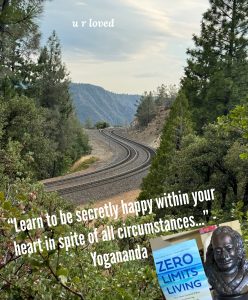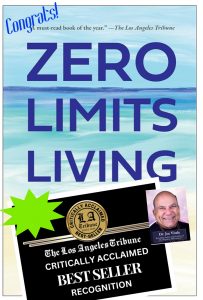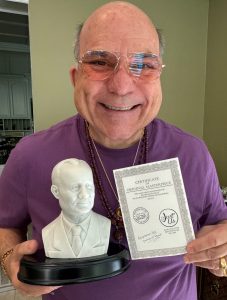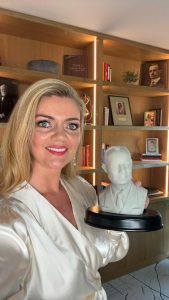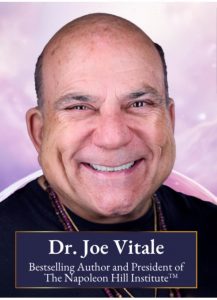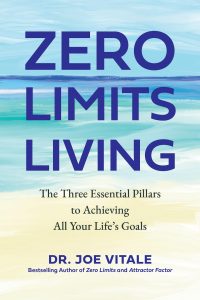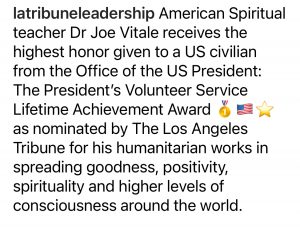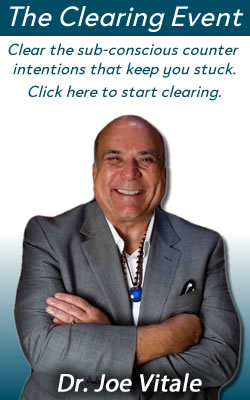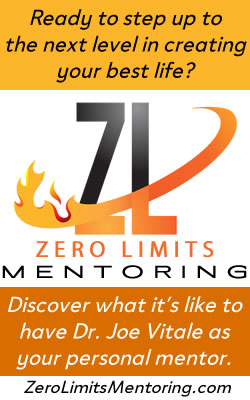Dr. Joe Vitale’s Blog
Secretly Happy
Imagine you’re walking through a busy city street, surrounded by the noise of traffic, the rush of people, and the chaos of everyday life.
You notice a person sitting quietly on a bench, a serene smile on their lips, completely at peace with the world around them.
They’re not scrolling through their phone, not lost in thought, just… happy.
Happy? Here?
You might wonder, “How on earth can they be so content in the midst of all this madness?”
This image is the essence of Paramahansa Yogananda’s wisdom when he said –
“Learn to be secretly happy within your heart in spite of all circumstances.”
Secretly happy?
In spite of circumstances?
What does this really mean, and more importantly, how can you and I achieve it in our own lives?
Yogananda is not suggesting that we should ignore our problems, pretend everything is fine, or plaster a fake smile on our faces.
He’s talking about cultivating a deep, inner well of happiness that isn’t dependent on external factors.
This is the kind of happiness that isn’t shaken by a bad day at work, an argument with a loved one, or even the big life challenges that come our way.
It’s a secret happiness—something personal, internal, and incredibly powerful.
So, how do you tap into this secret source of joy?
Here are possible steps…
**1. Start with Gratitude: The Happiness Fuel**
Gratitude is like the kindling that starts the fire of happiness.
When we take a moment to appreciate what we have—our health, a good cup of coffee, the love of a pet—it’s like sending a signal to the universe that we’re ready to receive more joy.
For instance, think about your morning routine.
Instead of rushing through it, take a moment to savor it.
Smell the coffee, enjoy the warmth of the shower, and appreciate the quiet before the day begins.
These small acts of mindfulness can transform ordinary moments into pockets of joy.
**2. Embrace the Power of Perspective**
Have you ever noticed how two people can experience the same event and have completely different reactions?
One person might get upset because it started raining during their picnic, while the other dances in the rain.
The difference?
Perspective.
Choosing a positive perspective doesn’t mean you ignore reality; it means you choose how you respond to it.
If you’re stuck in traffic, instead of fuming, consider it a chance to listen to your favorite music or catch up on a podcast.
If you’ve had a setback, see it as a learning opportunity rather than a failure.
The more you practice shifting your perspective, the easier it becomes to find that secret happiness, no matter what.
**3. Connect with Your Inner Self**
Yogananda was all about tuning in to your inner self.
This isn’t about escaping into your own world, but rather about finding a sense of peace and contentment that comes from within.
Practices like meditation, deep breathing, or simply spending time in nature can help you reconnect with this inner calm.
For example, start your day with just five minutes of meditation.
Sit quietly, focus on your breath, and let go of any thoughts that come to mind.
This simple practice can help you carry a sense of peace with you throughout the day, making it easier to stay happy even when things don’t go your way.
**4. Let Go of What You Can’t Control**
There’s a lot in life that we can’t control, and that’s okay.
The weather, other people’s actions, the past—these are all beyond our reach.
But what we *can* control is our reaction to them.
Yogananda’s secret happiness comes from accepting this truth.
Instead of wasting energy worrying about things you can’t change, focus on what you *can* do.
Maybe you can’t control a rainy day, but you can decide to bring an umbrella, dress warmly, or plan an indoor activity instead.
By letting go of what you can’t control, you free up mental space for happiness.
**5. Spread the Joy**
Finally, happiness isn’t something to keep all to yourself.
It grows when you share it.
Simple acts of kindness, like complimenting a coworker or helping a neighbor, not only brighten someone else’s day but also deepen your own sense of joy.
Remember, happiness is contagious.
When you’re secretly happy within your heart, people will notice.
They’ll wonder what your secret is and may be inspired to find their own inner joy.
**Putting It All Together**
Learning to be secretly happy within your heart, despite all circumstances, is a journey—a daily practice of gratitude, perspective, inner connection, acceptance, and sharing.
It’s not about being happy all the time or ignoring life’s challenges, but about cultivating a resilient joy that stays with you, no matter what life throws your way.
So next time you find yourself in a less-than-ideal situation, take a deep breath, smile inwardly, and remember Yogananda’s words.
“Learn to be secretly happy within your heart in spite of all circumstances.”
Your happiness is your secret, and it’s always within your reach.
Just like that serene person on the bench, you too can find peace and joy in any circumstance.
It’s your superpower, your secret weapon—and the best part?
It’s already inside you, just waiting to be discovered.
Doesn’t that thought alone help make you happy?
Expect Miracles.
Ao Akua,
Dr Joe Vitale
Napoleon Hill or Bust
I own Napoleon Hill’s head.
Not the actual one he carried on his shoulders, but one I had custom made based on his portraits.
Napoleon Hill of “Think and Grow Rich” fame taught that you could discover wisdom by getting advice from “invisible allies.”
Well, Hill is one of my advisors.
But he passed away in 1970.
Now, with his head on my desk, I can have a 3-d experience of chatting with him.
It makes him a lot more real.
It makes our “conversations” a lot more real.
I gave one to Don Green, President of the Napoleon Hill Foundation.
I also gave one to Cliona O’Hara, CEO of Napoleon Hill Institute.
I gave yet another to Russell Brunson.
Why is a bust of a leader so important?
I have heads of Seneca, Marcus Aurelius, Emerson, Twain and other giants.
I have signed photos and books by others who have influenced me, from Jack London and Jack Dempsey to Harry Houdini, Yogananda, and P.T. Barnum.
All of this is to help me stay inspired, motivated, and curious.
All of it makes the now deceased greats seem alive to me.
What do you do to communicate with the legends?
Who do you communicate with?
Ao Akua,
Dr Joe Vitale
PS – You can have a Hill bust, too. The original sculpture of Napoleon Hill is by https://www.justusmonuments.com/product-page/napoleon-hill-bust-copies
Completing Napoleon Hill’s Assignment
Now that I’m President of the Napoleon Hill Institute, I’ve had the pleasure of completing the challenge Andrew Carnegie delivered to Hill in 1908.
Let me tell you the story…
Last month I flew to New York City for the first Napoleon Hill Institute event since the famous self-help author died decades ago.
Before the event began, the Institute CEO, Cliona O’Hara, and her camera crew drove over to the Carnegie Mansion in Manhattan.
That’s the place where a young nobody reporter in 1908 had the chance to meet and interview the world’s wealthiest man, Andrew Carnegie.
At that historic meeting, Carnegie challenged Hill to devote his life to compiling the science of success. Carnie would make introductions but he wouldn’t pay anything.
As generous as Carnegie was, he wasn’t going to support an unknown reporter, at least not financially.
Hill agreed.
And Hill hit the ground running.
He began an intense and persistent two decade long research project.
Along the way he created an entire course in 1925, and of course the famous Think and Grow Rich book in 1937.
And Hill kept producing books and courses until his death in 1970.
But Carnegie didn’t see any of it.
The legendary tycoon died in 1919, long before Hill had any real success.
My staff and I felt we needed to complete the mission.
We needed to go to the Carnegie Mansion, get into Carnegie’s study where he met Hill in 1908, and put a copy of Think and Grow Rich on the shelf.
We did just that.
I’ve posted video footage of the memorable event on my IG and FB pages.
But whenever you go to the Carnegie Mansion, see if you can peek into the library.
You’ll find the ghosts of Hill and Carnegie there.
And a copy of Think and Grow Rich.
Challenge completed.
Ao Akua,
Dr Joe
PS – My latest book releases tomorrow! Go get it in hardcover, Kindle, or audio formats, wherever you like to get books. Expect Miracles! 🙂
US President Lifetime Achievement Award to Dr. Joe Vitale
On May 18 2024 I was given the US President Lifetime Achievement Award in Temecula, California.
The Los Angeles Tribune nominated me and the Oval Office approved it.
Words still fail me.
All I can say is “Thank you.”
Gratefully,
Dr. Joe Vitale
PS – My latest book is available for preorder: www.ZeroLimitsLivingBook.com
QiCoil Abundance or How I Attracted $32,000 Overnight
Let me explain.
I’m pretty open minded, and always curious about tools that can help you and me attract our goals.
I’m not sure what I expected but get this –
But I’m experimenting with the QiCoil and getting truly excited about the possibilities with it.
PS – My interview of the inventor is at
“You have the power to make things seem hard or easy or even amusing.” – Seneca

